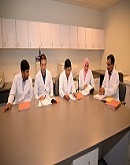FORENSIC DNA TYPING
Incorporation of DNA typing into crime investigation and parentage testing has proved to be of tremendous importance in forensics. Analysis of human DNA has shown that every individual has unique DNA except the identical twins. Obviously, therefore, the DNA profile provides an excellent means to identify a criminal from a group of suspects. However, the utility of this modern DNA technology critically depends on the methods of the procurement of biological clues from the crime scene, from the body of victim and offender, its packaging and transport to the DNA laboratory.
In order to cope with changing needs of Crime investigation, Centre for Applied Molecular Biology (CAMB), established the first state of the art DNA analysis laboratory of Pakistan in 2002. The laboratory is well equipped and has a cadre of specifically trained forensic scientists (trained from USA). The laboratory is providing services for DNA analysis in criminal & paternity cases to the Law enforcement agencies & Courts. Forensic DNA analysis services had been provided in more than 3500 cases including rape, murder, sodomy, dead body identification, bomb blasts, robbery, and paternity cases.
To ensure that the techniques of DNA Typing are most usefully applied, CAMB has made tremendous efforts to train crime investigating officers, and medico-legal doctors to properly procure the biological evidence material for DNA testing. Many officers and officials from police, military police, I.S.I and I.B had been trained in procuring biological evidence from the crime scene. The laboratory has also conducted training workshops for medico-legal doctors and two introductory mini workshops on “DNA for Justice” have also been conducted for Judiciary and lawyers. Foensic DNA typing group is actively engaged in research and development. The group is involved in the study of autosomal STRs, mini STRs, X-STRs, Y-STRs, mitochondrial DNA, and SNPs. Several M. Phil and Ph.D students have completed their research work on these STRs and SNPs studies. Research work of this group has been published in peer reviewed impact factor journals of national and international repute.

